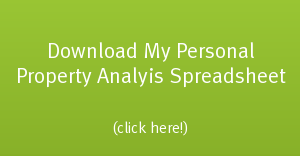In a recent article I wrote on BiggerPockets.com concerning partnerships, I mentioned knowing the difference between “front-end” and “back-end” debt-to-income. Today I want to briefly discuss what that is, and why it is important for a real estate investor, or just a casual homeowner, to know.
What is Debt-to-Income?
“Debt-to-Income” is a ratio, used by banks and other financial institutions, to determine how much credit you are using compared to how much income you make.
Why does this matter?
Because income is deceptive.
Let’s say you make $10,000 per month in income (we’re just pretending…). Could you afford a car payment that is going to cost you $500 per month? You probably want to quickly respond with “yes, of course” but like I said, income is deceptive. If your $10,000 income is eaten up with a $9600 house payment – you couldn’t do it. Banks are smart (okay, that’s debatable) and they understand this. This is where the debt-to-income ratio comes into play.
Your debt-to-income is the total amount of minimum payments you make on your debt divided by the total income you make in a month.
For those who love math (guilty!) here is how the equation looks:
Debt to Income = Debt Payments / Monthly Gross Income.
So, if your gross income (before deductions) is $10,000 each month and your minimum debt payments are $3500 per month, then your debt-to-income ratio is 35%.
A bank does not want you to be “over leveraged,” because it increases your risk of not paying back the loan. The more debt you have, the higher chance the bank has of losing money.
What is “Front-End” and “Back-End” Debt-T0-Income?
“Front-end” debt-to-income uses the formula above and simply looks at the debt related to the mortgage – including property taxes and insurance. For example, if your mortgage payment (with taxes and insurance) is $1500 per month and your income is $10,000 per month, your front-end debt-to-income ratio is 15%.
“Back-end” debt-to-income, on the other hand, uses the above formula to determine your ratio, but includes the minimum monthly payment on all your debt, including credit cards, student loans, mortgage (with property taxes and insurance), auto loans, and any other debt that might show up on your credit report (including loans you might have co-signed for that are not even yours). So, if your credit report shows that you have $3000 per month in minimum monthly payments plus your $1500 mortgage payment all on your $10,000 monthly income, your back-end debt-to-income will be 45% ($3000+$1500 / $10,000).
Why Does Debt-to-Income Even Matter?
Debt-to-income is important because you want to qualify for a mortgage.
You cannot qualify for a mortgage with a bad debt-to-income ratio. Lenders will require you to fit below their maximum standard for debt-to-income in order to qualify. If your debt to income is too high – your application won’t even be looked at. You will be shot down automatically by the computers who first process your loan.
Even if right now you aren’t looking around for a loan, you will eventually. At that point, you need to make sure you debt-to-income is in good standing.
What is a Good Debt-to-Income Ratio?
While every bank has their own standards (and can often slightly bend them if you qualify in every other way), generally a bank would prefer:
- Your front-end ratio be less than 30%. AND
- Your back-end ratio be less than 40%.
This is often written with a hyphen, such as 30/40.
Keep in mind, a bank will usually want BOTH ratios to be correct in order to qualify.
So, going back to our story of you earning a $10,000 income – your front-end debt-to-income ratio would allow you to purchase a home that cost you $3000 per month (including property taxes and insurance). Your back-end debt-to-income would allow all of your total monthly debt payments – including the loan you are trying to get – to be less than $4,000 per month.
Obviously, if you are trying to get a mortgage you may have other qualifications to pass before getting a loan, but by making sure you at least fit within the debt-to-income ratio you are one step closer to hearing the banker say “Yes!”
Photo from s_falkow
P.S. looking for hard money loans in California? Be sure to check out my friends over at northcoastfinancialinc.com. They have very competitive rates, can fund within a week and specialize in fix and flip loans and other hard money loans.
 If this is your first time here at Real Estate In Your Twenties.com - welcome!
If this is your first time here at Real Estate In Your Twenties.com - welcome! 





